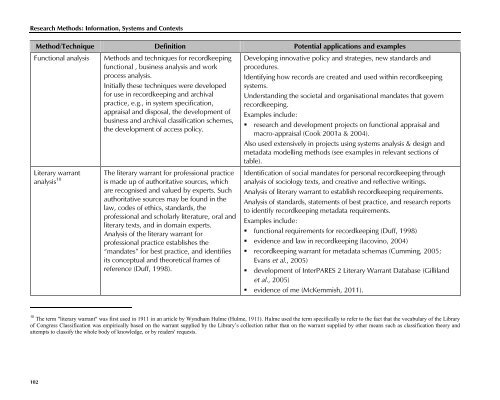Archival and recordkeeping research
Archival and recordkeeping research
Archival and recordkeeping research
You also want an ePaper? Increase the reach of your titles
YUMPU automatically turns print PDFs into web optimized ePapers that Google loves.
Research Methods: Information, Systems <strong>and</strong> Contexts<br />
102<br />
Method/Technique Definition Potential applications <strong>and</strong> examples<br />
Functional analysis Methods <strong>and</strong> techniques for <strong>recordkeeping</strong><br />
functional , business analysis <strong>and</strong> work<br />
process analysis.<br />
Initially these techniques were developed<br />
for use in <strong>recordkeeping</strong> <strong>and</strong> archival<br />
practice, e.g., in system specification,<br />
appraisal <strong>and</strong> disposal, the development of<br />
business <strong>and</strong> archival classification schemes,<br />
the development of access policy.<br />
Literary warrant<br />
analysis 10<br />
The literary warrant for professional practice<br />
is made up of authoritative sources, which<br />
are recognised <strong>and</strong> valued by experts. Such<br />
authoritative sources may be found in the<br />
law, codes of ethics, st<strong>and</strong>ards, the<br />
professional <strong>and</strong> scholarly literature, oral <strong>and</strong><br />
literary texts, <strong>and</strong> in domain experts.<br />
Analysis of the literary warrant for<br />
professional practice establishes the<br />
“m<strong>and</strong>ates” for best practice, <strong>and</strong> identifies<br />
its conceptual <strong>and</strong> theoretical frames of<br />
reference (Duff, 1998).<br />
Developing innovative policy <strong>and</strong> strategies, new st<strong>and</strong>ards <strong>and</strong><br />
procedures.<br />
Identifying how records are created <strong>and</strong> used within <strong>recordkeeping</strong><br />
systems.<br />
Underst<strong>and</strong>ing the societal <strong>and</strong> organisational m<strong>and</strong>ates that govern<br />
<strong>recordkeeping</strong>.<br />
Examples include:<br />
<strong>research</strong> <strong>and</strong> development projects on functional appraisal <strong>and</strong><br />
macro-appraisal (Cook 2001a & 2004).<br />
Also used extensively in projects using systems analysis & design <strong>and</strong><br />
metadata modelling methods (see examples in relevant sections of<br />
table).<br />
Identification of social m<strong>and</strong>ates for personal <strong>recordkeeping</strong> through<br />
analysis of sociology texts, <strong>and</strong> creative <strong>and</strong> reflective writings.<br />
Analysis of literary warrant to establish <strong>recordkeeping</strong> requirements.<br />
Analysis of st<strong>and</strong>ards, statements of best practice, <strong>and</strong> <strong>research</strong> reports<br />
to identify <strong>recordkeeping</strong> metadata requirements.<br />
Examples include:<br />
functional requirements for <strong>recordkeeping</strong> (Duff, 1998)<br />
evidence <strong>and</strong> law in <strong>recordkeeping</strong> (Iacovino, 2004)<br />
<strong>recordkeeping</strong> warrant for metadata schemas (Cumming, 2005;<br />
Evans et al., 2005)<br />
development of InterPARES 2 Literary Warrant Database (Gillil<strong>and</strong><br />
et al., 2005)<br />
evidence of me (McKemmish, 2011).<br />
10 The term "literary warrant" was first used in 1911 in an article by Wyndham Hulme (Hulme, 1911). Hulme used the term specifically to refer to the fact that the vocabulary of the Library<br />
of Congress Classification was empirically based on the warrant supplied by the Library’s collection rather than on the warrant supplied by other means such as classification theory <strong>and</strong><br />
attempts to classify the whole body of knowledge, or by readers' requests.


